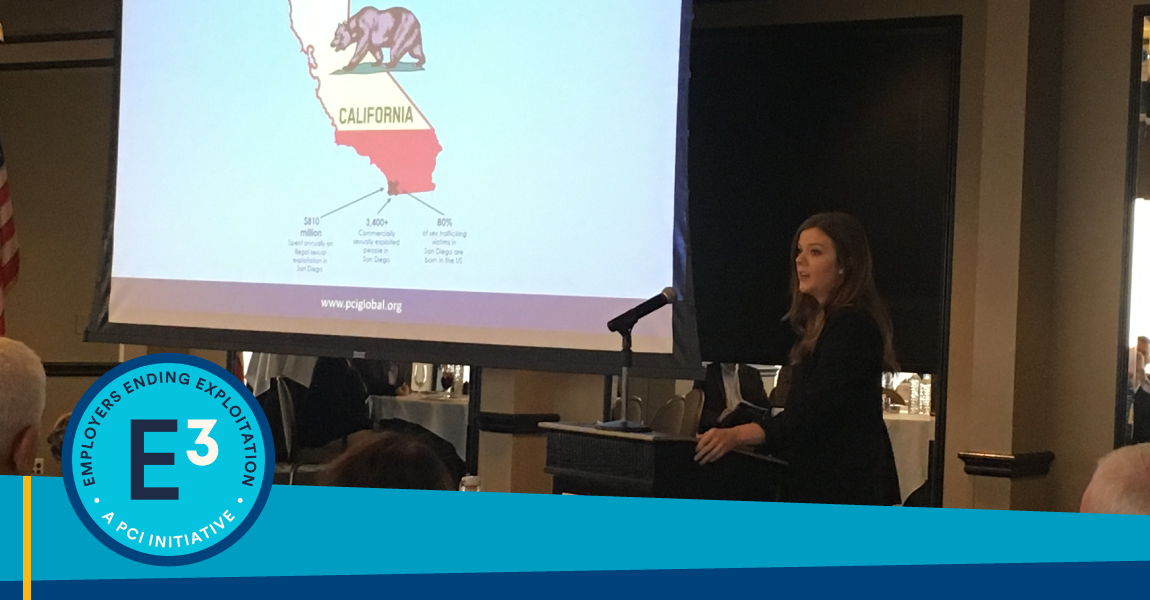Advancing Collaboration with E3 Alliance: Employers Ending Exploitation
About the Organization
E3 Alliance is a collaborative of nonprofits, businesses, and governments working together to leverage the collective power of the private sector to eradicate sex trafficking. E3 Alliance is an initiative of Global Communities, formerly PCI. We provide human trafficking prevention training for employees from every business and every industry.

Featured Guest
Hannah Allen, Chief Program Officer
E3 Alliance: Employers Ending Exploitation
Approach to Collaboration
As a county-wide Alliance, E3 invites the private sector to the table to better understand the role of businesses in the fight to end trafficking. Just as importantly, we aim to connect newly energized advocates with nonprofit and government efforts that have been working for years to provide recovery services for victims, prosecute sex buyers and pass legislation that protects those who have experienced exploitation. Together, E3 Business Partners, Community Partners, and Government Partners strengthen the citywide movement to end sex trafficking in San Diego.
Application of the 9 Considerations for Collaboration
Build Trust
Prior to establishing the organizational framework of E3 Alliance, we spent time getting to know and gaining the trust of the advocates and organizations fighting trafficking in San Diego. We hosted a community event to establish the mission statement of the Alliance, and we held countless small meetings with victim service organizations, Survivor Leaders and government agencies to learn what efforts were in place, and where private sector engagement could fill gaps. We continue to maintain these very important relationships and have established a rapport that invites feedback and space for creativity and growth. E3 Alliance was designed to meet needs and enhance efforts of those already at work in this space.
Have a Vision
Since our organization supports an active movement, we must be willing to pivot at any given time. We set long-range goals — to educate the San Diego workforce about human trafficking, provide a way for businesses to engage with the local movement directly, and identify safe, compassionate, long-term employment opportunities for Survivors.
Because the final piece is so important, we’ve resisted anticipating what the process of finding employment for survivors might look like in the future. To ensure success, we put the onus back on businesses to tell us how they plan to provide jobs for survivors. E3 will be there every step of the way to ensure that businesses have the resources and education they need to create employment opportunities for survivors.
Seek to Assure the Success of Your Collaborators
We are active participants in community meetings around human trafficking, including the San Diego County Regional Human Trafficking & Commercial Sexual Exploitation of Children Advisory Council. The San Diego District Attorney’s Office developed the Advisory Council to provide space to learn about current needs from the victim service organizations, upcoming events, legislation, law enforcement efforts, and most importantly, to hear the voices of Survivor Leaders.
Internally, we continuously revisit the mission of E3 Alliance to ensure all efforts align with our promise to the community. We are an open-door organization that invites feedback, challenges, and new ideas from all E3 Partners and community members. When we train businesses about human trafficking, we do so side-by-side with a local Survivor Leader who can offer their perspective if/when they feel compelled to do so.
Take Stock
During the early stages of E3 Alliance, we set out to create all-new tools and training that we could use to educate the San Diego private sector about human trafficking. We’ve found that the E3 Alliance is better served as a connector amongst efforts and as a distributor for effective existing tools and training. Local Survivor Leaders and Lived Experience Experts have created effective presentations and training to share with the community. We are honored to share their work by identifying and inviting them to present their area of expertise with businesses, partners, and other organizations in our community.
Our staff is devoted to the cause, and we know the best and most effective teachers are those who have experienced exploitation themselves. We are also committed to ensuring Survivor Leaders and Lived Experience Experts are compensated for their time and expertise.
Start Small
E3 Alliance was carefully constructed over a couple of years to hear from relevant stakeholders, including victim service organizations, Survivor Leaders, law enforcement, and advocates. Before we could invite the private sector into this space, we asked existing stakeholders, “how can business engagement in the fight to end trafficking benefit you/your clients/victims/your organization?” Feedback included: funding, meeting space, event support, paid internships, pro bono professional services, volunteers, advocacy, in-kind donations, job shadowing, and more. We kept this feedback at the forefront of our design.
Our broad vision is to provide prevention education to the private sector, invite them to engage in the existing movement, and identify safe and stable long-term employment opportunities for people who have experienced exploitation or may not have traditional work experience.
Fail Fast, and Build Rigorous Feedback Loops
We are constantly learning, growing, and adapting. As a nonprofit, we don’t have the luxury of giving our efforts time to play out. We must ideate, collaborate, prototype, test, and adapt quickly to continue bringing urgent and practical prevention education to the business community.
An example of this effort is when we invited a handful of large San Diego businesses to be the first to join — thinking “the first to join” was an attractive offer. We learned these businesses wanted to see our track record of success with training other smaller businesses before committing. We had to abandon the “Founding Partners” idea and invited smaller companies we had relationships with first. We now have 48 E3 Alliance Partners. (16 Business, 3 Government, 29 Community)
Take a Portfolio Approach
Our website e3sandiego.org is the only space in the anti-trafficking community where victim service organizations can post any need they have, and newly energized advocates from businesses can visit and either fill a need or offer up goods/services. This two-way engagement space exists to determine deficiencies in real-time and let those energized around this cause plug into the movement in a very personal way. Engagement amongst businesses and victim service organizations is key to the success of E3 Alliance.
Consider Non-Traditional Partners
We have a robust and powerful set of leaders sitting at the table. The anti-trafficking community lacks the support of big and small businesses. During the design of E3, we identified gaps in efforts — echo chambers, accessing parents, financial support, compassionate employers, demand reductions, dispelling myths, child safeguarding, and more.
We are missing powerful, influential private-sector leaders who can open the door to accessing what had previously been missing. We also have found great success and support by reaching multiple business leaders at once through membership-oriented groups like Rotary, Biocom, Soroptimists, and YPO. We need businesses from every sector to join the fight against human trafficking and help us see those previously overlooked.
Keep Your Donors Apprised of Your Collaborations
We draft a monthly report with updated numbers of new E3 Partners, engagement efforts, collaboration opportunities, and completed and upcoming employee training.
Future Collaborations
Ideally, we would obtain buy-ins from large employers with massive influence, such as Qualcomm, who would not only invite us to train their tens of thousands of employees but would engage in the local movement (volunteer groups, meeting spaces, advisory roles, etc.) and would financially invest in E3 Alliance to ensure the sustainability of the Alliance.
Conclusion
Revisit your organizational mission regularly, keep lines of communication open and ongoing with relevant stakeholders, accept feedback – good and bad; be willing to pivot and prioritize organizational sustainability for the sake of the cause.
This article was composed by Rachel Romana Liu.

